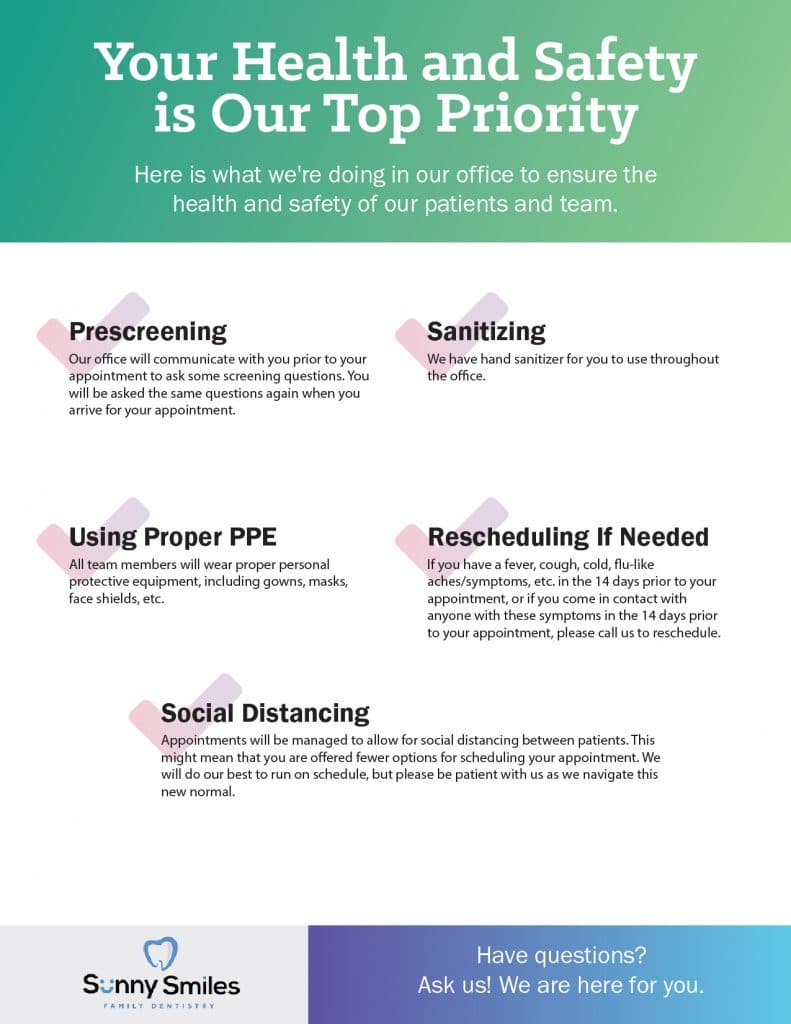 Leaving a cavity untreated can lead to a problem that affects more than just your tooth. As decay worsens, your pulp – the inner chamber of your tooth – can be exposed to bacteria. When this occurs, you can suffer from dental sensitivity and tooth pain. If the problem is not addressed at this stage, bacteria can move through your root to create additional concerns for your well-being. Your El Paso, TX dentist is ready to take on an advanced cavity, and protect your oral health, by performing a root canal treatment. When a root canal treatment is performed, it protects you from an issue that could cost you your tooth! (more…)
Leaving a cavity untreated can lead to a problem that affects more than just your tooth. As decay worsens, your pulp – the inner chamber of your tooth – can be exposed to bacteria. When this occurs, you can suffer from dental sensitivity and tooth pain. If the problem is not addressed at this stage, bacteria can move through your root to create additional concerns for your well-being. Your El Paso, TX dentist is ready to take on an advanced cavity, and protect your oral health, by performing a root canal treatment. When a root canal treatment is performed, it protects you from an issue that could cost you your tooth! (more…)
Stepping Up Your Cavity Prevention Regimen
 Should you make plans to improve the quality of your smile care at home? People can commit to looking for improvements after experiencing cavity troubles, in order to avoid restorative dental work in the future. This can be a smart decision, but you should not feel like you have nothing to worry about just because you have avoided cavities in your last few visits with your El Paso, TX dentist. You may not realize how wear and tear on your enamel, small diet changes, and other factors have affected your oral health. Identifying areas where you can do a better job keeping your teeth healthy can help you continue to stay protected against tooth decay and gum disease. Of course, even after stepping up your oral care routine, you should keep up with regular dental exams. (more…)
Should you make plans to improve the quality of your smile care at home? People can commit to looking for improvements after experiencing cavity troubles, in order to avoid restorative dental work in the future. This can be a smart decision, but you should not feel like you have nothing to worry about just because you have avoided cavities in your last few visits with your El Paso, TX dentist. You may not realize how wear and tear on your enamel, small diet changes, and other factors have affected your oral health. Identifying areas where you can do a better job keeping your teeth healthy can help you continue to stay protected against tooth decay and gum disease. Of course, even after stepping up your oral care routine, you should keep up with regular dental exams. (more…)
Take Part In The Last Sunday Hike At Weyler Aerial Tramway
 If you want to enjoy an opportunity to see more of El Paso’s natural beauty, as well as a chance to meet other outdoor enthusiasts, check out the Last Sunday Hike! During May’s Last Sunday Hike event, participants will meet at Weyler Aerial Tramway State Park to walk the Directismo trail. This is a good chance to go out with friends, or meet new people, as you see the sights of the area. This event is FREE to join, but you should be prepared by bringing your own water and snacks, and having appropriate footwear. Hiking is a fun form of exercise that can keep your body in good health. If you want to keep your teeth in good health, make sure you attend regular dental checkups! Your El Paso, TX dentist is prepared to offer quality care at every appointment. (more…)
If you want to enjoy an opportunity to see more of El Paso’s natural beauty, as well as a chance to meet other outdoor enthusiasts, check out the Last Sunday Hike! During May’s Last Sunday Hike event, participants will meet at Weyler Aerial Tramway State Park to walk the Directismo trail. This is a good chance to go out with friends, or meet new people, as you see the sights of the area. This event is FREE to join, but you should be prepared by bringing your own water and snacks, and having appropriate footwear. Hiking is a fun form of exercise that can keep your body in good health. If you want to keep your teeth in good health, make sure you attend regular dental checkups! Your El Paso, TX dentist is prepared to offer quality care at every appointment. (more…)
When Should My Wisdom Tooth Extraction Take Place?
 People need their wisdom teeth removed at different times, and in some cases, removal may not be necessary. Your El Paso, TX dentist can recommend the right time for wisdom tooth extraction based on their movement. When it appears that they will erupt soon, removal can be advisable. This procedure stops your wisdom teeth from becoming impacted. This can lead to discomfort, and the crowding of your other teeth. If you want to be warned of when it might be the right time to have your wisdom teeth extracted, make sure you are attending regular dental exams. The reviews that take place in these appointments allow your dentist to monitor the movement of your wisdom teeth, and to let you know when it might be time to talk extraction. (more…)
People need their wisdom teeth removed at different times, and in some cases, removal may not be necessary. Your El Paso, TX dentist can recommend the right time for wisdom tooth extraction based on their movement. When it appears that they will erupt soon, removal can be advisable. This procedure stops your wisdom teeth from becoming impacted. This can lead to discomfort, and the crowding of your other teeth. If you want to be warned of when it might be the right time to have your wisdom teeth extracted, make sure you are attending regular dental exams. The reviews that take place in these appointments allow your dentist to monitor the movement of your wisdom teeth, and to let you know when it might be time to talk extraction. (more…)
Use A Modern Prosthetic To Replace Your Missing Tooth
 Few oral health problems are as difficult to work around, or ignore, as tooth loss. If your smile is not complete, it can be a big problem for your appearance, and it can make actions like biting, chewing, and speaking harder for you. You should know that you have access to quality prosthetic dental care from your El Paso, TX dentist’s office. With a proper restoration in place, your appearance and dental function can see meaningful improvement. In addition to talking with you about the value of a prosthetic restoration, your dentist can discuss the benefits of having your restoration set on a dental implant. (more…)
Few oral health problems are as difficult to work around, or ignore, as tooth loss. If your smile is not complete, it can be a big problem for your appearance, and it can make actions like biting, chewing, and speaking harder for you. You should know that you have access to quality prosthetic dental care from your El Paso, TX dentist’s office. With a proper restoration in place, your appearance and dental function can see meaningful improvement. In addition to talking with you about the value of a prosthetic restoration, your dentist can discuss the benefits of having your restoration set on a dental implant. (more…)
Has Your Teeth Grinding Habit Led To A Chipped Tooth?
 When you first start to grind your teeth at night, you can wake up with unpleasant pain in your face, jaw, and teeth. The problem, known as bruxism, can be concerning right away, but it can actually worsen over time. If you let the problem go untreated, you could wind up doing real damage to your smile. The pressure you are putting on your teeth by grinding them at night is enough to leave them chipped. In addition to making them look less healthy, this may leave teeth more vulnerable to further harm. Your El Paso, TX dentist can talk to you about restoring a chipped tooth, as well as about correcting your problems with bruxism. (more…)
When you first start to grind your teeth at night, you can wake up with unpleasant pain in your face, jaw, and teeth. The problem, known as bruxism, can be concerning right away, but it can actually worsen over time. If you let the problem go untreated, you could wind up doing real damage to your smile. The pressure you are putting on your teeth by grinding them at night is enough to leave them chipped. In addition to making them look less healthy, this may leave teeth more vulnerable to further harm. Your El Paso, TX dentist can talk to you about restoring a chipped tooth, as well as about correcting your problems with bruxism. (more…)
3 Dental Problems That Should Not Be Ignored
 If you want to maintain good oral health, and preserve the look of your smile, you should take any symptoms of dental troubles seriously. Your El Paso, TX dentist’s office is prepared to offer restorative dental treatment to individuals who show signs of troubles with tooth decay, or other issues that can impact your well-being. Unfortunately, people sometimes try to simply ignore signs that something is wrong, even as those signs interfere with their quality of life. If you have any problems that are making it difficult for you to practice your normal dental function, if you have chronic pain, or if you are trying to deal with an incomplete smile, schedule an appointment. Continuing to ignore these problems can lead to a situation becoming worse. (more…)
If you want to maintain good oral health, and preserve the look of your smile, you should take any symptoms of dental troubles seriously. Your El Paso, TX dentist’s office is prepared to offer restorative dental treatment to individuals who show signs of troubles with tooth decay, or other issues that can impact your well-being. Unfortunately, people sometimes try to simply ignore signs that something is wrong, even as those signs interfere with their quality of life. If you have any problems that are making it difficult for you to practice your normal dental function, if you have chronic pain, or if you are trying to deal with an incomplete smile, schedule an appointment. Continuing to ignore these problems can lead to a situation becoming worse. (more…)
Professional Dental Cleanings Protect Your Teeth And Gums
 If you want to preserve a healthy smile in the long term, your regular dental checkups are important. These visits with your El Paso, TX dentist’s office create opportunities for your smile to be carefully examined. The reviews performed can lead to the discovery of problems that can be addressed with the appropriate restorative dental work before they grow more serious. Of course, you also enjoy important care in the form of dental cleanings provided to you at these visits. A professional teeth cleaning can result in the removal of harmful substances, including tartar, which can remain despite your brushing and flossing efforts. (more…)
If you want to preserve a healthy smile in the long term, your regular dental checkups are important. These visits with your El Paso, TX dentist’s office create opportunities for your smile to be carefully examined. The reviews performed can lead to the discovery of problems that can be addressed with the appropriate restorative dental work before they grow more serious. Of course, you also enjoy important care in the form of dental cleanings provided to you at these visits. A professional teeth cleaning can result in the removal of harmful substances, including tartar, which can remain despite your brushing and flossing efforts. (more…)
Take Advantage Of Historic Sites Day On May 5!
 On Sunday, May 5, you can enjoy opportunities to visit historic locations in the El Paso, TX area thanks to Historic Sites Day! This special day has been established as part of National Preservation Month, as well as Texas Travel And Tourism Week. Throughout the day, state historic sites are welcoming visitors for FREE! This can be a fun opportunity to visit a landmark you have yet to check out, or a cheap way to return to a favorite place. Because it is closed on Sundays, the Sam Rayburn House will offer free admission on Saturday, May 4. Just as local history is important to any community, professional dental care is important to your smile! Your El Paso, TX dentist’s office can provide important services for you and your family at every routine dental checkup! (more…)
On Sunday, May 5, you can enjoy opportunities to visit historic locations in the El Paso, TX area thanks to Historic Sites Day! This special day has been established as part of National Preservation Month, as well as Texas Travel And Tourism Week. Throughout the day, state historic sites are welcoming visitors for FREE! This can be a fun opportunity to visit a landmark you have yet to check out, or a cheap way to return to a favorite place. Because it is closed on Sundays, the Sam Rayburn House will offer free admission on Saturday, May 4. Just as local history is important to any community, professional dental care is important to your smile! Your El Paso, TX dentist’s office can provide important services for you and your family at every routine dental checkup! (more…)
What Should You Expect Your Filling To Do For Your Tooth?
 It can be scary to realize just how harmful a cavity can be to a tooth. Even when they are caught in their early stages, cavities cause permanent damage to your enamel. In other words, the spread of decay leads to an irreplaceable loss of dental material. This is an understandably serious issue. Fortunately, restorations are effective at supporting a tooth, so that loss does not create lasting troubles. Your El Paso, TX dentist’s office is able to create lifelike dental fillings that bond to your tooth structure. A filling is meant to protect you from future infections, and they offer support to make sure you can still bite and chew with the affected tooth. (more…)
It can be scary to realize just how harmful a cavity can be to a tooth. Even when they are caught in their early stages, cavities cause permanent damage to your enamel. In other words, the spread of decay leads to an irreplaceable loss of dental material. This is an understandably serious issue. Fortunately, restorations are effective at supporting a tooth, so that loss does not create lasting troubles. Your El Paso, TX dentist’s office is able to create lifelike dental fillings that bond to your tooth structure. A filling is meant to protect you from future infections, and they offer support to make sure you can still bite and chew with the affected tooth. (more…)




